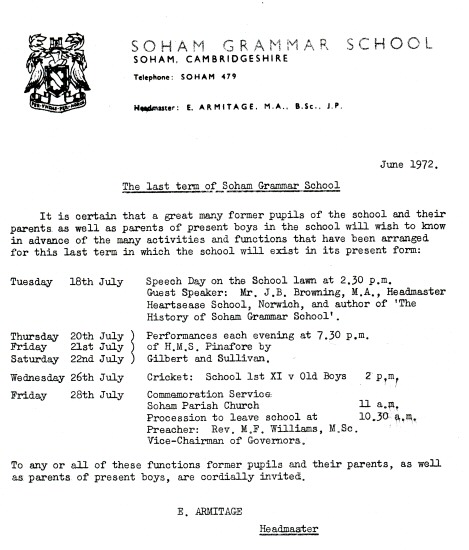Soham Grammarians - 2012 Dinner Talk
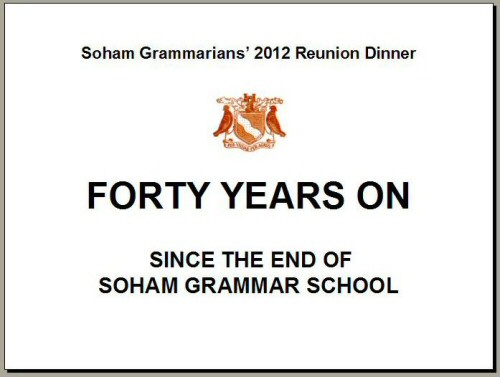
On the night even though the talk was longer than
usual there was not enough time to cover
everything that contributors had provided. This account rectifies
that.
Further memories, photos are welcome.
The following took part in this talk:
| Mr
Dick Bozeat |
SGS
Woodwork 59-72; staff SVC 72-93 |
| Alan
Dench |
SG67-72,
then at Ely College 6th Form Centre |
| Vince
Gudgeon |
SG66-72;
Boarding House; then at Ely College 6th Form Centre |
| Frank
Haslam |
SG'59'-66;
website editor, database |
| Ian
Hobbs |
SG48-55,
Captain of OBs Cricket and Football teams in 1972 |
| Ed
Kisby |
SG67-72,
then at Ely College 6th Form Centre |
| Ed
Reed |
SG67-72,
then at Ely College 6th Form Centre |
| Simon
Thornhill |
SG65-72;
Boarding House |
| Mr
Peter Scott |
SGS
Maths 60-72; teaching staff Ely College 6th Form Centre 72-93:
IT team 1993-2010 |
| Mr
Gareth Wood |
SGS
Chemistry 64-72; staff Ely College 6th Form Centre 72-93:
Head of Science, Senior Master |
|
Contributing
material shown on this page but not present at the Dinner:
|
| Mr
John Browning OBE MA |
SGS
History 47-51, Guest of Honour at the last SGS Speech
Day/Prizegiving, 18 July 1972 |
| Mike
Hawes |
SG69-72,
then at Ely College 6th Form Centre
(sadly we ran out of time to include it on the night) |
| Stephen
Melton |
SG65-71 |
Introduction
Frank Haslam: this report has the
following structure:
- SGS ethos - views from the Staff Room: Comprehensivisation - staff
involvement?
- What the newspapers said
- The final SGS events
- Those who stayed at Soham
- Those who went to Ely
- In retrospect
A reminder of who was on SGS Staff in
1972
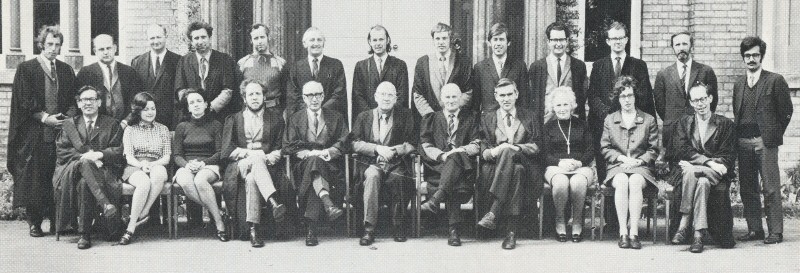
back:
AO Russ - DH Riley - GH Duffett - R Russell - PD Scott - RJ Humphry - J
Llewellyn-Jones - AG Cornell - LE Priddle - RJ Abbott - RG Wood - HL Homer
-T Abdullah
front:
RJ Makin - Mlle F Pauly - Miss P O'Keeffe - PJ Askem - EH Tabraham - E
Armitage - RA Taylor - RGS Bozeat - Mrs M Armitage - Mrs V Laird - LR Hart
Not shown/already left:
Miss AR Dunton, GWT Edwards, Mrs MJ Fordham, Mrs RLB Guyon, Mrs JPH
Jarrett, AJ Mason, Mrs AL Smith, Mrs BM Wilkes
Peter Scott: That photo must have been taken on a
Friday as I am in uniform!
Frank Haslam: Mlle Françoise Pauly was killed two
years later in the crash of a Turkish Airlines DC-10 in Paris.
SGS ethos - a view from the Staff Room.
Comprehensivisation - staff involvement?
Dick
Bozeat: My fondest memory of SGS was one of a large
happy family working together close harmony under the
excellent leadership of Edward Armitage. It was for me very
much a way of life, not a job. Wonderful times spent on the
playing fields in Cambridgeshire and beyond with Peter Taylor,
encouraging and watching our school teams competing,
mostly successfully, in Football, Cricket and Athletics.
Dramatic productions would come around and time was spent
making sets and ensuring they worked on the night. I don't
think I ever saw a production from front of stage, but there
throughout them all.
My principal purpose was to teach Woodwork, Games and some Art
throughout the school. Over the years Woodwork became an
A-Level subject and many boys enjoyed great success and
satisfaction from their efforts. I recall one former pupil,
now a doctor of medicine, telling how his experience of
woodwork and the use of tools was to him a great advantage
when embarking on Surgery at university.
I felt ill prepared for the change to the Village College
although much preparation had taken place. Few of the old SGS
staff remained at Soham, most having taken up posts at Ely in
the new Sixth Form Centre created there to serve Soham,
Witchford, Littleport and Ely: Peter Taylor (Head of Lower
School), Lionel Hart (Head of Modern Languages), Tony Russ
(Head of Physical Education) and myself (Head of Technical
Studies). It was all very different, a large campus, three
times the size of SGS both in area and number of pupils, girls
now included and all abilities. |
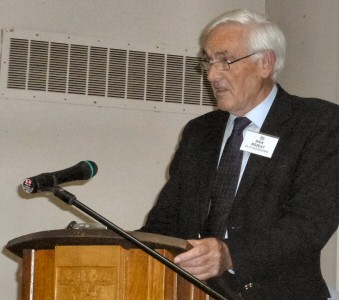
Dick Bozeat, SGS Woodwork 59-72;
staff SVC 72-93 |
The Principal was one Albert Lawrance
(AEL), well known in the area and to the old boys of SGS, having taught
at the grammar school in the 1950s and 1960s as Head of Mathematics. He
was a complete control freak and found it difficult to delegate
responsibility. Strong on discipline, his principles were very much
those of a Grammar School with emphasis on academic success. One
drawback for the future success of the Federation of Witchford, Ely and
Soham and the central Sixth Form in Ely was that Lawrance openly
encouraged pupils from Soham to seek their sixth form education away
from Ely, in particular at Cambridge Hills Sixth Form College and even
further afield. This certainly had an adverse effect on Ely and our
relationship with the Federation.
A year or so after going comprehensive we had an Ofsted inspection and I
recall that the main criticism was that "We were more like a Grammar
School than most Grammar Schools." This was taken as a compliment by
AEL, far from critical.
Under AEL's guidance the most able children were well served and the
school was seen to be successful within the local community of Soham and
Ely and places were sought after from beyond the local catchment area.
Time moves on, but for me a way of life at SGS became a job at SVC. I
feel sure that the rounded and full education given is endorsed by the
fact that so many old Boys turn up for the annual reunions some 40 years
after the closure of SGS - a testament to SGS, a school only to to be
equalled, never bettered.
Mr Gareth Wood: I saw SGS as a generally happy,
purposeful, successful and typical boys' Grammar School which was
mutually respected by pupils, students, staff, parents and the
local community and was presided over by a highly esteemed Head
Master and scientist.
The School was highly regarded by the Local Authority and well
supported by them. It had been the only Grammar School outside
Cambridge in the old Cambridgeshire Authority and investment in it
was 'encouraging'.
The approach was sustained when the merger with the Isle of Ely
took place. As Head of Chemistry I was well supported by Mr
Armitage and, in addition to the normal departmental allowance, I
received every extra allocation for which I applied (and
subsequently wondered if I had applied for enough).
This situation was never to apply again throughout my teaching
career! [Incidentally, for the benefit of Frank (Haslam) and
Michael (Yeomans) semi-micro inorganic analysis sets and top-pan
balances were among my targets].
Opinions
Much of the Debate passed me by and I suspect most of the staff.
'Comprehension' was to happen and we would have to accept the
subsequent outcome. |
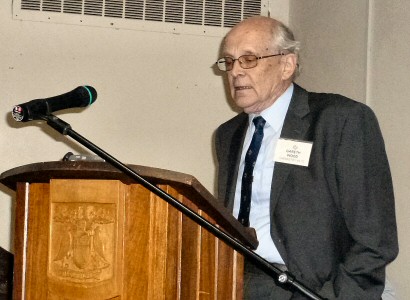
Mr Gareth Wood: SGS Chemistry 64-72; staff Ely College 6th Form
Centre 72-93:
Head of Science, Senior Master |
Final Events
I was ill for five of the last six weeks [a possible 'heart attack'
which was never confirmed and has not recurred in the last forty
years!]. I returned for the last week of the term (era?!) and spent much
of it at Ely as the new Head of Science sorting out the Departmental
timetables for the forthcoming year. I did not neglect my duties at
Soham, however, and was involved in the final ceremony.
City of Ely College (incorporating the Sixth Form Centre)
The new school at Ely did provide an enhanced career structure for me
which I had already used [HoScience] and was able to use once more later
on. It was, for me, a new mixed-sex environment. In the first week, one
lunchtime, Don Riley and I could only find two available seats in the
6th Form canteen - opposite two young ladies; we hoped not to embarrass
them but both of us were surprised with the aplomb and maturity with
which they took our arrival. Subsequently, I do not think I would have
wanted to return to a single-sex school voluntarily.
The school ran smoothly form the outset and there were fewer problems
than might have been envisaged - not least because Peter Scott had
produced (at the expense of his summer holidays) an excellent, precise
and effective timetable. Communication between staff was not as easy as
we had been used to and we may well not have seen some colleagues from
week to week. I did miss the possibility of teaching all-through (the
same students from O-level on to A-level) and, particularly, teaching a
whole A-Level group in all aspects of the Chemistry A-level course.
Peter
Scott: My teaching career started here in 1960 as Second in
the Mathematics Department. Having acquired over time several
other responsibilities, I also took on in the late 1960s the major
task of producing the school timetable.
This was definitely an out-of-term activity, taking up most of my
summer holiday and the whole of our dining-room table.
During the last Summer Term, in
1972, I was looking forward to my first free summer. This was
not to be. We were then living, as now, in one of the pair of
school houses built in the old Beechurst orchard.
Our neighbour for that term was
Peter Thacker, the newly appointed Principal of the Ely
Federation of Village Colleges who would have overall charge of
the four Colleges of the Federation.
He had decided that he would
produce the timetable for the combined college at Ely. I first
met him when we received a knock at our front door; he had come
across a problem. He had with him the timetable for Needhams
School (there was only the one copy, normally kept in the Head's
office).
His problem was in finding a
curriculum: one class would have 5 periods of RE and one period
of Science, another, in the same year would have 4 periods of
Science and no RE.
|
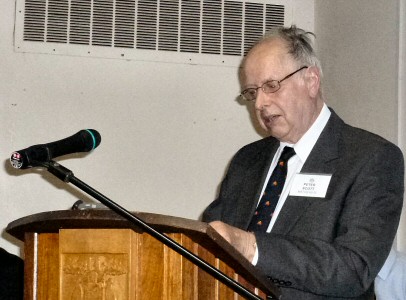
Mr Peter Scott: SGS Maths 60-72; teaching staff Ely College 6th
Form Centre 72-93: IT team 1993-2010 |
It turned out that this was the norm
throughout the school; in completing the timetable, Tom Walker would use
any staff still available to teach their subject to the classes which
still had vacant slots. Peter Thacker started work on the timetable in
Bedford House, later to be used as teaching space by the new College.
The plan was that he would complete the main school timetable and later
in the term, I would go over and add the Sixth Form timetable. The
timetabling was done by using small coloured cards for staff, with
different colours for subjects and rooms. These were then pinned onto
timetable slots on large boards. Simple mathematics will tell us that
with 40 periods a week and around 60 staff there would be over two
thousand staff cards alone.
All went well, albeit very slowly until,
by the end of term, space became available at the school in Downham
Road. As the partly finished boards were bundled into and out of the
minibus the inevitable happened; a good proportion of the cards detached
themselves and, since one pin-hole looks much like another, could not
realistically be replaced. At this point I was called upon to complete
the timetable for both the main school and the Sixth Form, which I
continued to do for many years.
Needless to say I did not use pins and
small cards. The unfinished main school timetable was transcribed in
pencil onto the 40 inch wide drafting film that I had used at Soham and
the whole timetable eventually completed. Copies were made using the
plan copier which the Grammar School had been given some years
previously by Fisons machinery company in Soham.
It was at the Staff Meeting following the
final Commemoration Service in St Andrew's Church that Don Riley and I
were thanked by Mr Armitage and, for the first and only time, referred
to as 'Don and Peter'. After 12 years of 'Scott' - or 'Mr Scott' if I
had done something wrong - I was rather surprised that he actually knew
what our Christian names were. This, however, was typical of the Grammar
School. Although probably appearing over-formal to the outsider it was
in fact a closely knit family of staff and students, united in a common
purpose.
The twelve years I spent here began what
was to be 50 years in Secondary Education in Cambridgeshire. I could not
have wished for a better start.
What the Papers said
Frank Haslam gave this review of what the papers said, in
chronological order. The articles can be seen in full here:
Soham Advertiser, November 2, 1967
‘Comprehensive’ plans at Soham
SGS +SVC 11-18 mixed comprehensive
Burwell VC mixed 11-14
Ely Standard, December 28, 1967
SOHAM OLD BOYS' DINNER 'A WAKE’
Tom Riley ... himself a
product of the Grammar Schools, semi-retiring as as they
approach end:
“I can almost hear a fat posthumous chuckle from Henry Morris
who looks like getting his way at last”
“Grammar Schools are being killed by their own success”
“You have to trust the people who will handle it to make the
best of it, so far as they are allowed. The opportunities will
still be there, if not quite the same and perhaps not
concentrated under this roof.”
Edward Armitage: Old Boys have a statutory right
to send sons to the school.
|
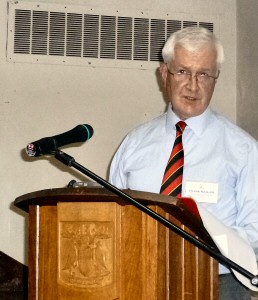
Frank Haslam: SG'59'-66; website
editor, database |
Cambridgeshire Times, December 4/5, 1969
Comprehensive Education finds favour at Ely; rejected at Soham
Plans by now revised: no
sixth form at Soham, only Ely
Needhams meeting: 11 attended, all in favour
SGS meeting: 152-6 against
Edward Armitage: “children attending the new 11-16 school at Ely
would be part of the larger 11-18 school, with a Sixth Form attached.
Therefore the children of Soham, Haddenham, Sutton, Fordham etc will be
at a disadvantage compared
with Ely children: -
" .. no child likes changing schools”
“ .. whilst Ely children would be encouraged to
stay at school, many from surrounding areas would be tempted into
the permissive atmosphere of local technical colleges at the age
of 16.”
“If these proposals go through, and a parent from
one of the villages concerned in these proposals came to me for
advice, it would be, 'Move
to Ely by September, 1971'."
Newmarket Journal, Thursday, February 12, 1970
Soham Head slams new proposals
George Edwards,
the Chief Education Officer for Cambridgeshire and the Isle of Ely gave
details of the new scheme at a teach-in at SVC: -
- Burwell VC excluded from the Soham/Ely area
- SGS and SVC amalgamate forming mixed comprehensive 11-16, to which SVC
catchment area pupils transfer at 11 plus.
- Roll of 760 in 1971
- one central sixth form at Ely … expensive equipment & resources
would be limited if more than one sixth form in the area
Edward Armitage:
“I'm all for the comprehensive system at the proper time. The scheme at
present is a mess. If you add the size of my sixth year and that of Ely
you get 154. I prophesy that if this scheme goes forward the sixth year
at Ely will be down to 100 or even less.“
55 for the proposals, 49
against.
Cambridge Evening News, Wednesday, April 29,
1970
Mr Albert Lawrance,
former Head of Maths at SGS & Senior Mathematics master at the
Cambridge Grammar School for Boys is appointed Warden of Soham Village
College. [He succeeds Mr PH Riggulsford who is to be head of a Bristol
comprehensive)]
Cambridgeshire Times, July 9/10, 1970
Parents renew fight against all-in schools
Proposals on May 24: amendment
for sixth forms at Soham and Ely defeated by 31 votes to 22.
So Federation will be:
- Soham: Single mixed 11-16 comprehensive
- Witchford Sec Modern & Martin School, Littleport as separate mixed
comprehensives with same age range.
- Ely HS & Needham's amalgamate making mixed 11-18 comprehensive
& providing central sixth-form for Federation.
The Final Soham Grammar School events
SELECTED
DIARY ENTRIES OF A FIFTH FORMER IN THE RUN-UP TO THE END
OF THE LAST SCHOOL TERM AT SOHAM GRAMMAR SCHOOL IN 1972
Wed 10 May – as O level preparation, travelled by mini-bus to see
Julius Caesar at Theatre Royal, Stratford-on Avon, trip
organised by the colourful and fiery Don Riley. I remember his
short temper flaring in negotiating busy traffic in an unfamiliar
vehicle!
Don ran the school choir for many years and it once appeared on
Anglia TV. We travelled far and wide, including a weekend in
Sheringham, Cromer (slept on Church Hall floor on the Friday
night! ) and Walsingham. The choir’s last event before disbanding
was at a church in Chippenham when we sang an emotional The
day thou gavest as a finale.
We also sang at popular Maths teacher Christopher Batman
Wain’s wedding in Chrishall.
Wed 24 May – German O level Oral exam. German had been
taught by the Headmaster’s wife May Fanny Armitage, the
wonderfully charismatic Lady of the Moat House, who delighted in
engaging the class at length in her Scots lilt with
tales of her family holidays abroad, often involving the
unexpected mishap, which made Spricht mal Deutsch
much more fun!. Her unforgettable catchword for keeping
order: Steady!! |
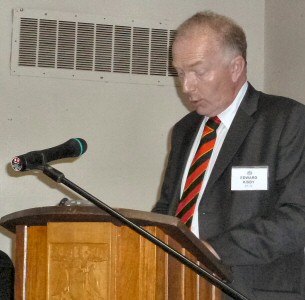
Ed Kisby SG67-72
then at Ely College 6th Form Centre |
Mon 5 June – Main O levels began.
Tues 6 June –English Language exam.
Fri 9 June – French 1 and Geography 1 exams. The culmination of Lionel Dalai
Hart’s tutoring us in French. Many a lesson when chairs would be cast
across the classroom in anger at poor marks. He was an obsessive with
league tables, with essay books strewn back to pupils in order of
position in class marking. The top five in French were usually Gregson,
Glover, Hill, Hardiment and me. Woe betide any who slipped below their
average slot! I had earlier been taught by Mr Rees when back in
1A, and was told by 1 Alpha how lucky we were to avoid the wrath of Slug
Riley’s class.
Mon 12 June – English Literature and French 2 exams
Wed 14 June – Maths 1 exam.
Thur 15 June – Chemistry theory exam. Back in 1A our first encounter
with the bunsen burner had been overseen by Chas Ford who
frequently left his 'dribble' mark on our books.
Fri 16 June – History and German exam. John Turge Abbott,
History teacher, had also been my form tutor and I was pleased that he
was to transfer to Ely when I studied History A level. He later went on
to excel as Chairman of East Cambs District Council.
Mon 19 June – Maths 2 exam
Tues 20 June – Geography 2 and German 2 exam. John Humphrey exuded
Oxfordian authority in Geography but I could never remember all the
correct crops and products generated in those Canadian provinces!
Wed 21 June – Chemistry theory – Gareth Basil Wood forecast I
would fail. I managed a grade 5 pass!
Tues 27 June – Additional Maths exam – last one – thank goodness!
Thur 6 July – returned to school after post exam break and handed
in old books! Scored for tennis tournament.
Fri 7 July - received 6th form timetable for Ely 6th Form College. First
of many choir rehearsals for Final Commemoration Service.
Mon 10 July – started 6th form timetable – still at Soham!
Tues 11 to Fri 14 – choir practices every day!
Tues 18 July – Speech Day! A formal occasion with Ted leading.
He was of course legendary and we revered him. My favourite memory of
him remains his grand entrances into the hall at school assembly, when
piano maestro Alan Steele was deputed to select an appropriately
orchestral warm-up fanfare style symphony on the sound system, and kept
us guessing each time as to whether the climax would arrive just as Ted
burst triumphantly through the doors and approached the stage in regal
fashion.
Wed 19 July – saw dress rehearsal of HMS Pinafore
Thur 20 July – choir practice – and watched cricket match (beware the
strains of rebuke “Sonny!” from the tractor-loving Charlie
[George?] Phelps with his famous shed, towards any boy who strayed into
an out of bounds area )
Fri 21 July – another choir rehearsal – then saw performance of HMS
Pinafore in evening
Mon 24 July – you guessed it – another choir practice!
Tue 25 July – choir rehearsal number 9
Wed 26 July – watched Old Boys’ cricket match
Thur 27 July – …and again – the last rehearsal, followed by watching staff
cricket match. Almost the last lunch in the famous canteen where RAT
and Dalai would preside, those sturdy metallic food
“troughs” and the formidable “Mona” the dinner lady who would keep all
aware of their clearing up duties regardless of whether staff or pupil,
and exert power through wielding her famous trolley at great speed!
Fri 28 July – THE LAST DAY OF SOHAM GRAMMAR SCHOOL. I’ll
never forget the formidable procession through the streets of
Soham to St Andrew’s Church for the Commemoration Service.
Solemn-faced Headmaster Ted Armitage was flanked by Deputy Tabby
Tabraham and Head of Lower School RAT Taylor.”My word”
indeed – what a formidable last stand! Much emotion as we sang our
hearts out with Peter Scott on organ to remember a wonderful school and
end of life as we knew it!
- - - -
Speech Day, 18 July 1972
John
Browning OBE MA (History 1947-1951)
Guest of Honour, at the last SGS Speech Day, 18 July 1972
(read on his behalf by Frank Haslam)
My reactions on reading Edward Armitage’s
invitations to be guest of honour and speaker at the last
Speech Day of Soham Grammar School were emotional, not
rational - surprise and pleasure but deep sadness and utter
disbelief that an ancient grammar school with a fine record
of achievement and service to the community was no longer to
continue as a grammar school.
The welcome on the day to me and my late wife
was warm and unstinting from Edward and his wife May; from
George Edwards, Cambridgeshire Chief Education Officer; and
the two dear colleagues surviving from 1947-51, Peter Taylor
and Ed Tabraham.
I never write down my speeches but I do recall
setting out the achievements of the School, fond memories of
colleagues, regret at the impending closure of what I valued
- in Wordsworth’s line Once did she hold the gorgeous
East in fee.
Perhaps this evening it is appropriate to
recite the last four lines of that Sonnet:
Yet shall some tribute of regret be paid
When her long life hath reach'd its final day:
Men are we, and must grieve when even the Shade
Of that which once was great is pass'd away.
[from On the Extinction of the Venetian Republic,
1802]
I also particularly recall Ed Tabraham’s
dramatic - even theatrical - crumbling up and throwing away
his prepared speech of thanks.
This was a return to where I had my four years
of apprenticeship, thankful for all I had learned.
My pleasure is tinged always in my memory with
the sadness of that day.
I assure you I think long and fondly of my
time at Soham and of my days under the leadership of Edward
Armitage.
|
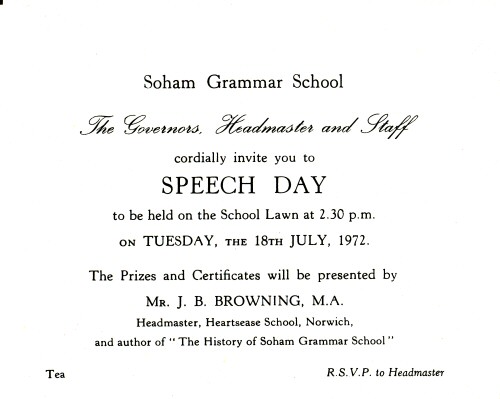
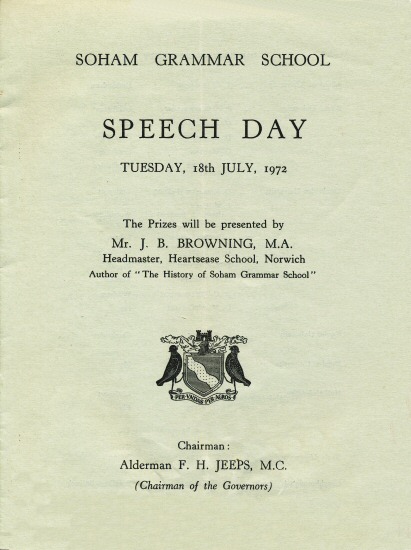 |
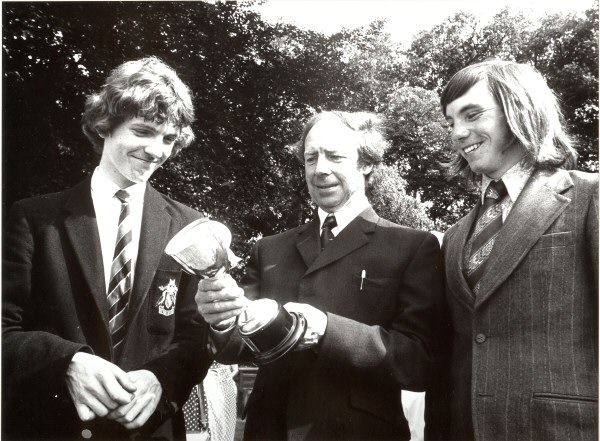
1972 Prizegiving: Simon Thornhill - John Browning (speaker) - Bruce
King: source Mrs Armitage
Simon was awarded the Stubbs Cup and Bruce was awarded the Bacon Cup.
The programme for this last Speech Day can be seen by clicking here
- - - -
Wednesday 21st July: Staff vs SGS 1st XI
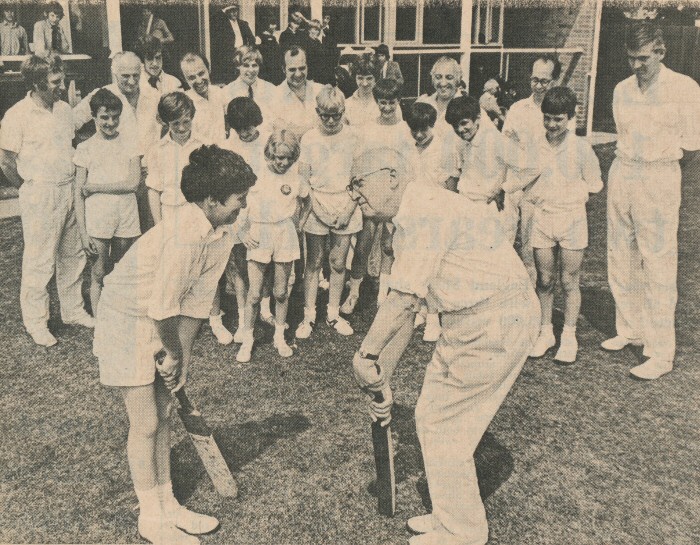
Robert Wiseman - Edward Armitage, with cut-down bat.
For the 1st XI photo, please see later.
Alan Dench has provided the
score-card for this match:
| SGS 1st X1 |
|
|
|
| Batsman |
How Out |
Bowler |
Score |
| Mr B King |
Ct B |
RGS Bozeat |
61 |
| Mr M Curtis |
Bowled |
RA Taylor |
17 |
| Mr I Cox |
LBW |
RA Taylor |
15 |
| Mr RV Brown |
RUN OUT |
|
3 |
| Mr PW Peachey |
Bowled |
RA Taylor |
0 |
| Mr MR Allen |
Ct AJ Mason |
AO Russ |
18 |
| Mr SJ Martin |
NOT OUT |
|
2 |
| Mr AG Simpson |
|
|
|
| Mr SL Murfitt |
|
|
|
| Mr TM McHugh |
|
|
|
| Mr RS Walker |
|
|
|
BYES
2
LEG BYES 5 |
NO
BALLS 2
WIDES - |
TOTAL
EXTRAS 9 |
TOTAL
125
for 6 wickets
dec. |
| |
|
|
|
| SGS Staff |
|
|
|
| Batsman |
How Out |
Bowler |
Score |
| Mr RO Russ |
NOT OUT |
|
55 |
| Mr RJ Humphry |
Ct Martin |
I Cox |
61 |
| Mr DJ Kilvington |
NOT OUT |
|
8 |
| Mr RA Taylor |
|
|
|
| Mr G Phelps |
|
|
|
| Mr RG Wood |
|
|
|
| Mr LNE Priddle |
|
|
|
| Mr RJ Abbott |
|
|
|
| Mr AJ Mason |
|
|
|
| Mr JEL Jones |
|
|
|
| Mr RGS Bozeat |
|
|
|
BYES
1
LEG BYES 2 |
NO
BALLS -
WIDES - |
TOTAL
EXTRAS 3 |
TOTAL
127
for 1 wicket
dec. |
- - - -
HMS Pinafore 20-22 July
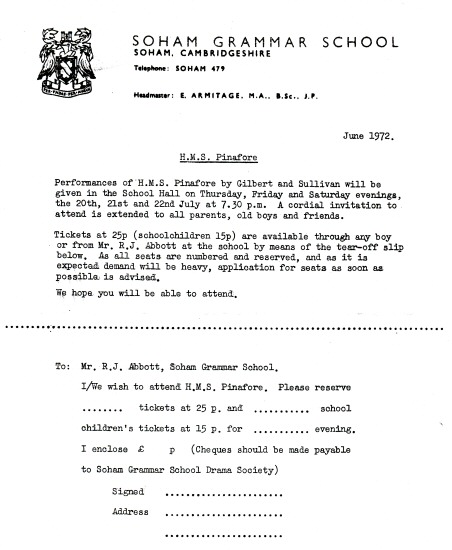 |
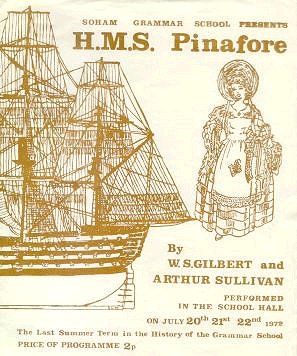
The cast list can be seen by clicking here |
- -
- -
26 July: Cricket – 1st XI v Old Boys
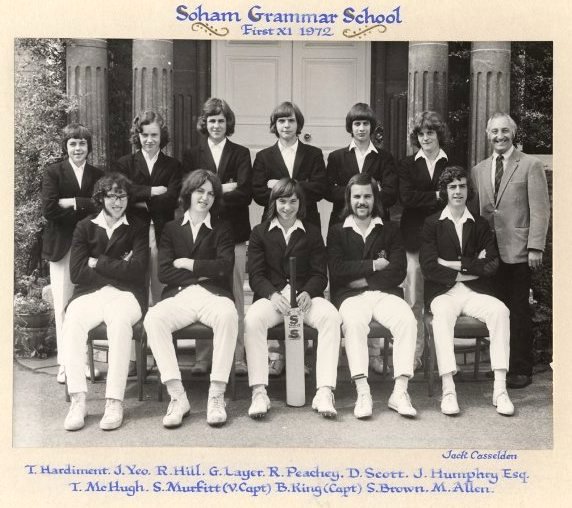
I
started with reference to an incident when I was in the 6th.
Form. For some reason I decided to have a crew cut. Mr
Armitage was in the middle of repelling 'These silly
Americanisms'. I had to visit the office and be told off.
Tonight, as I came up to the lectern to speak, a picture of a
long-haired Bruce King was on the screen and it reminded me of
the type of man Mr. Armitage was. Many years later, probably
in the 1970s he wrote to me to apologise and said he
would rather have crew-cuts than the then prevalent long hair!
It was my privilege, and I was proud, to captain the last School
v Old Boys, both in cricket and football – probably
because I was resident in Soham, not for my ability in those
sports.
In the football match we had a very strong side with
Eric Simper, Jonny Fretwell and Ian Booth who were playing for
Ely, Soham and Newmarket in the then Eastern Counties League.
As we were all playing in local leagues it was no surprise we
ran out winners 8-0. The school did well to keep it at that
level.
The cricket match was played on a brilliant Summer's day for a
change. Once again we had in the OB’s team very strong local
cricketers - Norman South, Brian Leonard, and David Bailey who
played for Littleport-Ely and the Pimpernels. Most of
the team were playing at a local level. |
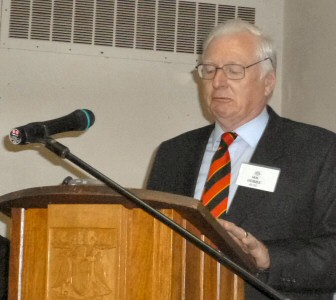
Ian Hobbs, Captain of the OBs
- "we thrashed them" |
As was the custom the OBs batted first and although few wickets were lost
the School did manage to curtail the run rate and I did not consider we
had enough runs to chance it. I decided to bat for a few overs after tea -
not a popular decision - but I had no idea of the School's batting
strength. I knew then that at the worst we were unlikely to lose.
I gambled on the bowling strength of Norman South.
I and Norman opened the bowling and it was apparent that the length &
pace of Norman, the ball coming at an awkward height to the batsmen, was
going to be a challenge. And so it proved to be, Norman bowling
throughout the innings, keeping the screw on, taking wickets at a regular
intervals.
The school was overcome - bowled out - for yet another OB’s victory.
- - - -
The Last Assembly
Stephen Melton SG65-71: [There were a
couple of times in my college years when I was home for the vacation
(long vacations at Oxford), I took the bus and paid an individual Old
Boy visit. I don't think I was responding to any general invitation.
I've got no memory of meeting others.]
I have one vivid memory of this occasion.
The Head had a pile of papers on the table in front of
him. He explained that these were the various speeches that he had given
at the end of each year that he had been at the school. Instead of
giving a new speech, he proposed to take the previous speeches and read
them all through, one by one.
There was a short pause as he turned over a paper or two,
allowing just enough time for the shock wave produced by this idea to
pass through the Hall.
Then he “changed his mind”, and read out a few extracts
instead.
The collection was genuine, because I went up to his study
afterwards and asked to see the speech for 1970, which I had missed.
- - - -
The walk to Soham Parish Church for the
Commemoration Service Friday 28 July 1972
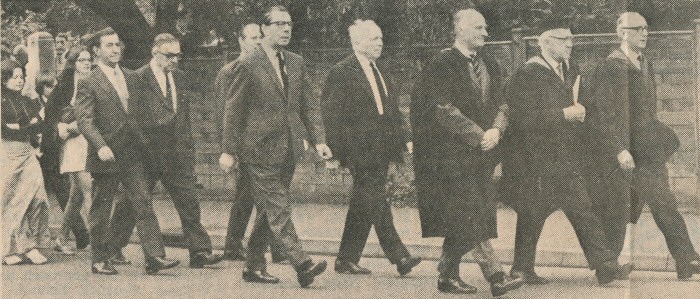
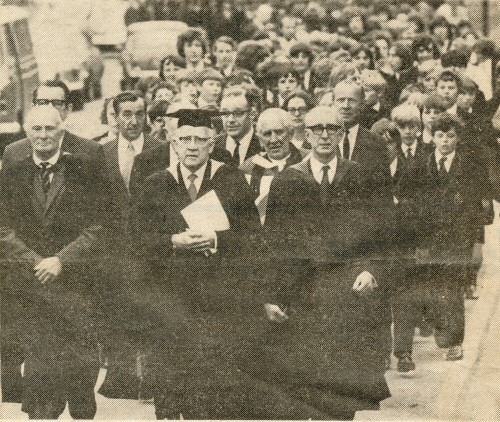

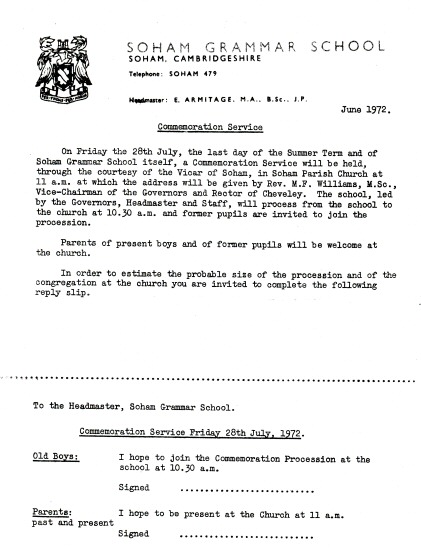 |
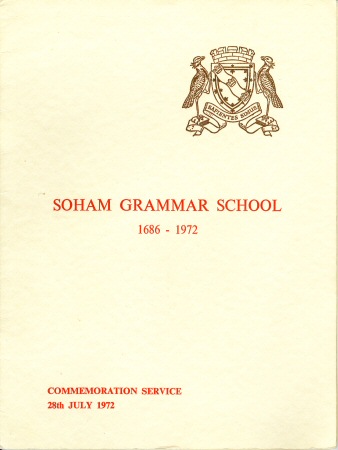
for the full order of service and report click here |
Peter Scott: My last, and altogether more pleasant
task at the Grammar School was to produce, with Don Riley the Order of
Service for the final Commemoration Service in St Andrew's Church, with
its three anthems sung by a hastily formed and trained choir. Frank
Haslam will know that one of the newspaper headlines was on the lines of
'School ends with Halleluja', referring to the last anthem, the Hallelujah
Chorus [Frank: I haven't seen that one but Dick Bozeat provided
one headlined 'Messiah' closes Soham school's final chapter] .
It neglected to mention that the first anthem, by Josef
Haydn, was Insanae et vanae curae - translated as 'Senseless and
futile cares assail our minds; deprived of hope, they often fill our
hearts with madness.'
- - - -
Edward Armitage's last letter to
Soham Grammar School parents, 29 July 1972
| … Now comes the last letter you will receive from me as
Headmaster. I hope it too will be up to standard.
…Your help in throwing your support behind us has been
invaluable not only to us on the staff but more
importantly to the boys who, generation after generation,
have grown up with a respect for the ordered liberal
society in which English men and women habitually thrive.
To the boys, including, indeed particularly including,
those who have needed occasional correction and punishment
I say "Remember Soham Grammar School and walk tall for you
are the last of the line".
|
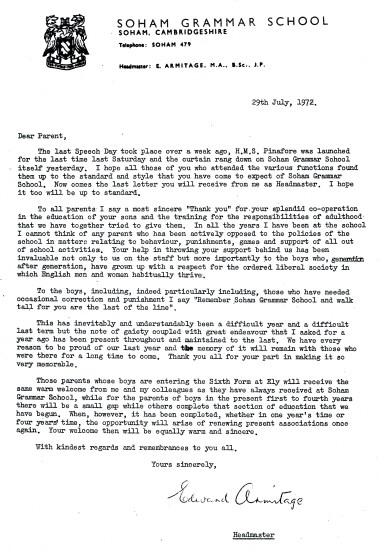 |
Staff who stayed at Soham
Dick Bozeat:
Woodwork
Lionel Hart: French
Tony Russ: Games/PE
RAT: History, Geography
Staff who went to City of Ely College Sixth Form Centre
John Abbott:
Head of History
Edward Armitage:
Director
Peter Askem:
Art
Tony Cornell:
Physics
Gerald Duffett: Biology
John Humphry:
Head of Humanities |
John Lewellyn-Jones: Biology
John Makin:
Science
Les Priddle: Maths
Don Riley:
English
Ron Russell: English
Peter Scott:
Maths
Gareth Wood:
Head of Science |
- - - -
Alan Dench SG67-72, then at Ely College 6th Form Centre
What do you recall of the information your parents received
about what was going on?
A leaflet was issued and distributed by Education
Authority at the time. No recollection by my mother or me of
any other direct communications. However I am now aware that
Edward Armitage sent a final letter to all parents at the end
of the school term, though the copy that my parents received
does not seem to have survived.
What were their concerns?
We were all more concerned with upcoming GCE O Levels. It
made it even more important to do as well as possible to
have the widest range of options post-16. As a boy from
Cambridge one of my options may have been to continue my
sixth form studies in Cambridge.
After the changes Cambridge was no longer in the catchment
area for the Federation, however we were guaranteed
continuity of education within the appropriate Federation
school if we had already started. The fact that Edward
Armitage and most of the Grammar School staff moved to the
Sixth Form Centre was a key determinant in my decision to
attend Sixth Form in Ely.
|
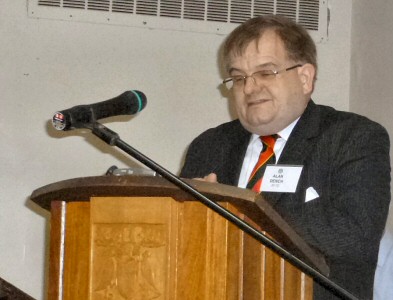
Alan Dench |
What were you told at SGS about what would happen in the new school
year 72-73?
For our year (Vth Form) our options were to either move to the Sixth
Form Centre at Ely, or move to another higher education college, or get
a job! Whatever happened at Soham Village College was of no concern to
us, as it had not been really for all the years that I was at Soham
Grammar School.
The only time when we had more contact with the Village College was
during the time that we were engaged in raising funds to build the
school swimming pool. This was a joint project with Village College
around 1968-69, I think?
What was the 'atmosphere' like in that last Soham Grammar School
year?
Variable. Rather like going through bereavement. But there were some
great moments of joy and celebration of all that was good about the
Grammar School. In the words of Jodie Mitchell, "Big Yellow Taxi"
- "... you don't know what you've got 'til its gone".
Did you feel that the change affected the attention given to
teaching/preparation for exams?
Probably not ... And if it was, the staff was too professional to let it
show.
What was the funny side of things that you recall?
Nothing comes to mind.
Alan continues:
The academic year 1971-1972 was the last year that Soham Grammar School
existed as a grammar school. When we were told that this was to be the
case, as a result of the proposed reorganisation of secondary education
in the county, my personal feelings were probably similar to those
experienced after bereavement – from sadness and tears to happiness and
smiles together with anger, annoyance, and confusion, uncertainty and
anticipation. It was my Vth Form year, having started at the Grammar
School in 1967. Therefore my primary focus was on the GCE Ordinary Level
examinations as the next step towards aspirations of sixth form and
university. For most of the year 1971-1972 it was business as usual.
However there were several notable events during 1972 to ensure that
the last days of the school would be memorable:
16th - 18th March: School Production of The
Taming of the Shrew. This was a joint production with
Ely High School for Girls.
19th April: The last Soham
Grammar School Group photo.
16th May: The Last Soham Grammar School Sports Day: programme
RAT's
last flourish in the programme read: Enfin tout est fini. Consummatum
est! All good things come to an end, not the least being Sports Day at
the Grammar School. We faced the changes from miles to metres with
regret and from pounds to kilos with annoyance but now we are faced with
the ultimate. Come then, let us to the task and make this day, the last,
the best.
Famous
names are recalled today - Norman, Sargent, Darby, Willett, Houghton,
Neate and many others too numerous to mention - and particularly that
little band led by Dick Houghton who in 1964, immediately after Sports
Day, went on to win three Shields out of four at the Fenland Sports,
including that of Champion School.
Athletic
glory was not however confined to that single year for this very present
year - 1972 no less - saw the success of our teams in the Fenland
Schools Cross Country Event in winning four Shields, including that of
Champion School.
Le
roi est mort, vive, le roi and Floreat Sohamiensis.
The
track's not all, a breathless hush has often descended on the cricket
field. At 90 not out would Reg Quiver make a 'ton' against the County
Club? Alas 'twas not to be, but David Bailey made a hundred against
King's Lynn to be surpassed by his 87 out of 103 for 1 against the
Perse. Bob Barber just a short time later made 100, against King's Lynn
and Martin Shalders won the match with 6 for 10.
In
winter we played Soccer. Goals galore! We shall not forget George
Peacock's six against the King's School while suffering from concussion,
nor Alan Parish's four against Huntingdon - his nose broken early in the
match. John Fordham played for Oxford v. Cambridge and 90 of us went to
see him play at Wembley. Geoffrey Burton got a Falcon at Cambridge but
no 'Blue' there. Did I say no 'Blue'? I almost forgot David Bray's for
Boxing.
Eric
Simper has played for Cambridgeshire for some time and has been captain
recently. Lester Newell still heads the list for goal scorers in the
Eastern Counties League. Our thanks to all those of many talents on the
field, good allrounders. Neates, Whetstones, Coxes, Souths, Leonards and
a host of others all laid a good foundation - ready for a
superstructure?
R.A.T.
22nd May: School Visit to the Treasures of Tutankhamun
exhibition at the British Museum in London. I remember being part of the
whole school group that went on this excursion to London. As I recall a
convoy of coaches departed from the Grammar School and took us to the
British Museum. We travelled in form/class groups and went into the
exhibition in these groups. The arrangements were structured and
organised to ensure that no one was lost or left behind.
From the 5th to 30th June it was heads down for the GCE examinations.
18th July: The Last Soham Grammar School Speech Day.
On 28th July: Commemoration Service. A fitting end to Soham Grammar
School and day filled with emotion and memories that have endured.
During the summer of 1972, while Soham Grammar School was making much
noise to finish with “a bang rather than a whimper”, the Cambridgeshire
and Isle of Ely County Council Education Committee was preparing us for
the 'brave new world' that was to come. A brief
guide was issued for parents, students and friends to
explain the Ely Federation of Village Colleges.
This informed us about the Federation and its facilities. It advised
that in future children would attend one of four Village Colleges – City
of Ely (Needhams), Littleport, Witchford or Soham (which included the
former Grammar School). Enrolment was comprehensive and
mixed/co-educational based on equality and catchment area not academic
ability. There was a common school uniform at all colleges for pupils up
to 16 years.
For those wishing to pursue sixth form studies (including A-Level) they
could attend a Sixth Form Centre at the City of Ely College. This was a
dedicated building on the City of Ely College site in Ely, which had
been the former Ely High School for Girls. The Heads of all the colleges
within the Federation had been appointed. The Federation had 14
Governors, of whom 7 were previously Governors of Soham Grammar School.
Alan Dench's Memories and memorabilia of
the Sixth Form Centre, Ely, 1972-1974
With the demise of Soham Grammar School at the end of the academic year
1972, I transferred to the Sixth Form Centre at Ely in September 1972,
together with 25 other boys from the Vth year.
We represented about half of the intake of Soham Grammar School Vth Form
classes A and Alpha. Also transferring were about 30 members of the Soham
Grammar School LVIth. And of course there were girls from the equivalent
years of the former Ely High School, plus a few students from Village
Colleges.
Edward Armitage was the first Director of
the Sixth Form. Half of the Governors of the Federation were former SGS
Governors. All except two members of staff who taught me were from Soham
Grammar School. The two exceptions were Peter Thacker, the Principal of
the City of Ely College, and Mrs Jones, a former Ely High School
teacher. Even the location of the Sixth Form Centre was the former Ely
High School. So, to me, it had a perceptual feel of a Grammar School 6th
Form
Having never attended a Sixth Form in the
Grammar School how would I know? But I felt that Edward Armitage did try
to maintain many aspects of the Soham Grammar School ethos:
- we had timetables, even though the first one had lessons for me
which were scheduled after my bus left for Cambridge in the afternoon!
These were quickly reassigned to earlier periods in the day. There
were no further problems with timetabling. The timetable included a
Director's Period in the Upper Sixth, which was akin to the
Headmaster's Period at the Grammar School Sixth Form.
- we had Parents' Evenings.
- we had end of term written reports from the tutors (aka masters at
SGS) on our progress
- we celebrated Royal occasions
- we had traditional AO and A Level studies, as well as opportunities
to take more O Levels
- we had an afternoon dedicated to games, though for those who
detested physical activity there was always extra double chemistry
(and some of us needed it!) .
There were many things that were different:
- girls!
- no daily morning assembly.
- no school uniform, though there may have been an unwritten 'dress
code' and students were advised that they “...will be expected to be
suitably and safely dressed.”
- no School Houses – Cromwell, Ridley, Hereward and Chicheley were
out!
- no prefectorial responsibilities as the Sixth Form Centre was an
entity unto itself separate from all the 11-16 colleges including
Needhams on the same site.
- a liberal attitude to attendance (up to a point).
- don't recall that there were any school rules, but could be mistaken
on that
- Liberal Studies which included such subjects as community studies,
cooking, needlework, boat building, child care, philosophy and
politics, medieval English literature, contract bridge, motor
mechanics, film studies and use of leisure.
- an elected School Student Council
- - - -
Boarders: Vince Gudgeon SG66-72
and Simon Thornhill SG65-72
Vince: Like Simon I was a boarder. I was very comfortable
with my lot. The move to the Sixth Form Centre at Ely came mid-way
through my Sixth Form years. I would have preferred to have been
able to complete those at Soham.
I think the change, merging with the Village College, might have
been more of an issue for the younger boys. That last term, Summer
1972 may as well not have existed. I do remember taking all my
stuff to Ely.
We were changing from the staff we had known for years to some new
faces, some of them more competent than others.
And of course we would be working with girls. The atmosphere was
more lenient and there was no longer any uniform.
|
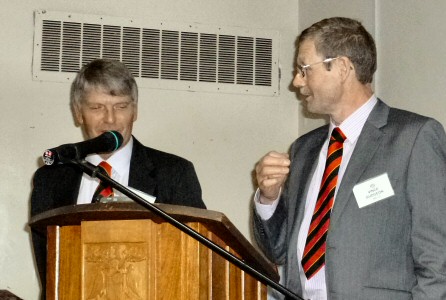
Boarding House: Simon Thornhill and Vince Gudgeon |
Simon: I had my head down doing
exams as it was my final year - I wasn't going to be affected by the
change.
The Moat was Mr and Mrs Armitage’s home
while he was Headmaster at Soham. However, it didn’t actually belong to
him and for reasons that I don’t recall was owned by the Education
Authority. There were 4 largish bedrooms which we called dormitories and
each room could take up to 3 or 4 boys. At most, I think that we had 16
boarders but there were normally around 12 boys. Vince, James Roberts
and myself were the senior boarders and, as the one in the oldest year
group, I was head boarder.
The Boarding House remained open for boarders right up to the end of
Soham Grammar School in July 1972. There was no special event or party,
as I recall, to mark the occasion but, as with all the other boys in the
school, we took part in the final church service in Soham Parish Church
on the last day.
After that, Mr and Mrs Armitage moved out
and bought their own house in Cambridge Road, Ely. The Village College
did not take boarders. The Moat was subsequently used by the Education
Authority for extra-curricular activities, youth club groups, games and
the like but rather fell into disrepair. Eventually was sold to Anne
Jarman (née Ford) and her husband, who, of course, live there to this
day. [Editor: The Moat had belonged to Ann's grandparents, the Morbeys].
The boys at the boarding house generally
did not come from great distances and so when the boarding house closed,
the boys who remained at Soham would have come in on a daily basis on
the school buses. Cambridge was about the furthest that we came from. I
was a Cambridge boy and a boarder because my dad thought that it would
do me good. I thoroughly enjoyed my time at The Moat so had no
complaints!
see also Boarding
House History
- - - -
Ed
Reed: Turning up to 6th Form at Ely in September 1972 was a
real culture shock with the ultimate and very welcomed distraction
of being amongst an equal number of girls, mostly but not all,
from Ely High School. I often wonder what they thought of us. I
was going to school again with some girls I had last been at
school with at the village primary school in Fordham.
It must have been a real struggle for the staff to try to
maintain the standards of both the previous two schools with the
huge amount of change going on. I was lucky as we were the first
year to complete both years at the Sixth Form but I felt
sorry for the year above us that were 'half and half' between the
two schools.
Sport was optional and on the first 'games' afternoon several of
us ex-Grammar School boys naturally gravitated over to, what we
thought, was the 5- a-side football pitches with the small goals.
Over came several of the girls with hockey sticks and we thought
that they would be absolutely no good at all at 5-a-side.
Of course they were hockey pitches so we went and grabbed a number
of hockey sticks and one of the teaching staff, Mr Astbury, who
played hockey for March, taught us all how to play mixed hockey.
We ended up playing a few inter -chool matches and did quite well.
I ended up playing at University and at club level till very
recently and I know that Nigel Tunnel, who became one of our best
players, played for Ely Hockey Club for a number of years. |
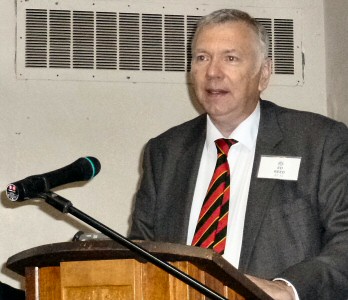
Ed Reed SG67-72,
then at Ely College 6th Form Centre |
As part of, I suppose, what was the ideal of the Comprehensive system at
the time, we were offered the opportunity (with a bit of obligation I
recall) of taking on a couple of “liberal studies” subjects. I had a go at
cookery (I thought it would be a good way to avoid starvation if I went to
University!) and motor mechanics, which having an interest in engineering
I really enjoyed.
Horror of horrors and unthinkable these days but we also had a smoking
room! Mr Armitage purposely chose the most spartan room in the school and
furnished it with the worst and most utilitarian furniture he could find.
None of this though seemed to deter the hardened smokers.
As you will see from our Grammarians' website there were some joint
musical and drama productions between Ely High and Soham Grammar and this
continued at Sixth Form with a very good production of Gilbert and
Sullivan’s Mikado as I recall.
There was no uniform and dress was very casual. During the first winter
green Parka coats were fairly fashionable but Ian Allen came to school in
one of the first, much more stylish, Afghan coats that we had ever seen.
After bumping in to him, Mr Armitage commented later that “I have just
come in to school and you will never believe this but a have just seen a
Yeti!”
We were taught by many familiar faces. In the subjects I took to A level,
Mr Armitage (who held the position of Director of the Sixth Form) and Tony
Cornell taught us for Physics. Gareth Wood and Mrs Jones (ex-High School
deputy head) taught us Chemistry. Peter Scott did his best to save our
bacon in maths during the second year after a difficult first year.
I think most of us ex-Grammar School boys have good memories of Ely Sixth
Form Centre. We matured quite a lot and many of us got involved in our
first romantic relationships. I think academically things inevitably took
a bit of a backwards step with the huge changes that the education system
underwent. The former SGS and EHS staff I think worked very hard to
get things on a firm footing. I understand that the link between Ely and
Soham schools weakened shortly afterwards which I think was a little sad.
- - - -
Michael Hawes SGS 69-72, then at Ely College 6th Form
Centre
I believe there was an attempt made to get Margaret
Thatcher, then Minister of Education, to halt or reverse the decision to
close SGS and create a comprehensive, but she confirmed the change. My
parents were not involved in that, as far as I can remember. In those
days, people just accepted things much more they do now - I’m sure there
would be more fuss made today.
I think my parents were reassured by the promise that our
curriculum would not change, and that we would be kept in the same forms
as before. The main concern was that Soham would not have its own sixth
form, but the provision being made at Ely sounded acceptable, especially
as Mr Armitage would be heading it up for the first few years until his
retirement.
Before the changeover, it was pretty much “business as
usual” right up until the end. I remember Mr TL Riley telling us that Mr
Armitage had asked him if he would carry on teaching at the
comprehensive, but he had replied “I will be there at the death, but not
at the funeral.” I suppose he felt he was too close to retirement age to
adapt to the huge changes that might be involved.
There was of course, a sense of sadness that a long era
was coming to a close, but the overall mood was quite positive. I think
it would have been better, psychologically speaking, and possibly more
honest as well, if the new school had been given a completely new name.
Among other things this would have avoided the perception that we were
being “taken over” by SVC. This perception was rebutted somewhat by Mr
Lawrance’s visit to an assembly in our final year, when he spoke of his
previous time at SGS and how he intended to preserve the traditions and
ethos of the school when he became Warden. Also, he caused SVC to be
known as The Village College, Soham, so maybe that was his
attempt to “re-brand” the new school within the limits set him.
I remember the closing ceremony at St Andrews Church,
especially the masters standing in line to shake our hands as we came
out of the church, which was very moving.
The teachers virtually emptied the library in the final
weeks of the summer term, with the books earmarked to go over to Ely. I
suppose they were deemed to be more suitable for sixth formers. It left
us with largely empty shelves for the first year or so of the new
school. When we came back to SVC in the autumn term, the front section
of the library area had been bricked off and turned into office
accommodation, which was a pity as it meant that the window seat in the
base of the tower was no longer available for reading at. So there were
few books on the shelves, and now quite a cramped space. The Lodeside
(former SVC) library was for “lower school” use and of no benefit to us.
That was the main negative thing that I remember. The
exercise books also changed. Previously they had had a stiff cover, with
a bespoke SGS label on them. Now, they were generic, with a flimsier
cover and lower quality paper inside. Apparently, Village Colleges did
not get the same level of funding as Grammar Schools for items of this
kind.
Initially, Cambs CC had conceived SVC as being part of a
four-school “confederation” feeding into the central sixth form at Ely -
there was a new tie, common to all the schools. Mr Lawrance slowly but
surely “declared independence”. I think this lay behind his introduction
of many new ties (eg the “scarlet” for sporting achievement, the
fleur-de-lys design for the fifth form, and then the reintroduction of
the SGS lower school tie featuring the pupil’s house colour).
There was some continuity for us, in the midst of change.
We would have become form 4 Alpha; instead we became 4R, with Mr Russ
continuing as our form teacher. Form 3A became 4H, with Mr Hart looking
after them. Our first year of ‘O’ level work continued unchanged from
the previous curriculum, with subject options coming at the end of the
fourth year.
A small number of other teachers came across from SGS - Mr
Bozeat comes immediately to mind. There was a great feeling of optimism.
Quite a few new teachers had needed to be recruited; many of these were
attracted by the chance to work at a brand new school - Mr Dolby, our
English teacher, was one of these, as was Mr Burroughs who taught us
history.
For me, the best thing about SVC in many ways was being
taught history by Miss Roberts (who became Mrs Ennion during my time
there). She had been a senior member of the SVC staff for many years.
The two-year course in social history that she taught us was superb. Mr
Lawrance’s maths classes would be a close second for me. In the fifth
year, the “A and alpha” forms were disbanded and we were put into small
groups determined by subject choice. Mrs Sanigar looked after our group;
she treated us like adults, which was really good.
There being no sixth form, fifth formers had the prefect
responsibilities, and generally enjoyed being the senior year of the
school. In fifth form biology, our set entered the Young Scientist
of the Year TV competition, which was a new departure for the
school.
Of course, a huge change was - the girls! What teenage boy
would complain? The fairer sex changed the whole atmosphere of the
place, on the whole for the better. There were practical adjustments
needed - incredibly (by today’s standards), the main toilets had been
virtually open to the corridor before. Now, they had to be bricked and
screened off.
There were other, more subtle changes that softened the
décor and facilities, and there was a blending of sweeter voices into
the break-time hub-bub. I enjoyed having some female school friends, and
it was good for us I think, as they often brought a different
perspective.
In retrospect
Gareth Wood:
- The Federation could and should have worked
better - there would have been a much more secure school (especially
at 6th Form level) in place in Ely now.
- If the Grammar Schools had remained it is more likely that A-Levels
would have remained more rigorous than they are.
- Recruitment of scientists (and other Academic subjects) might be
better, though there were already incipient problems in 1972.
Where do SVC leavers go?
According to the SVC Prospectus available in 2012 about 60% of
SVC leavers went on to a traditional academic A Level course
mainly at Hills Road or Long Road Sixth Form Colleges, but also at
Ely College Sixth Form, Impington Village College Sixth Form (IVC)
and at Netherhall School Sixth Form.
Those students who wished to pursue a more vocational course
tended to go to Cambridge Regional College, also to West Suffolk
College, where they could take a modern apprenticeship, and to the
College of West Anglia (COWA) in Milton.
|
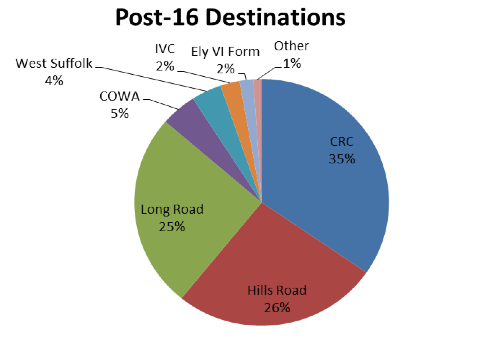
|
Frank thanked all who contributed to this
talk. Our patient audience showed their appreciation
Alan Dench SG67: It was fascinating to read
the contributions from everyone, especially those who did not get time
to speak on the night. I was struck by the comment from Mike
Hawes “The teachers virtually emptied the library in the final weeks of
the summer term, with the books earmarked to go over to Ely”.
The library at the Sixth Form in Ely was under the charge of Mr Don
Riley. He was assisted by Ed Kisby, Richard Smith,
Allen Batchelor and myself. I recall that the original
library at the former Ely Girls High School building which became the
Sixth Form College was considered too small for the collection of
books. This may have been in part due to the large number of
books taken from the Grammar School. As a consequence the
library was moved to the Assembly Hall which made for an impressive
location. The former library was converted into the Sixth Form
Common Room.
Frank Haslam SG'59': Whilst searching for something
else in August 2020 I came across this letter provided by one of those
in the Armitage address book, sent by Edward Armitage at nearly the end
of his first term as Director of the new Sixth Form Centre in Ely. It
was a typed letter sent to all, to which he added written personalised
comments. Here is the typed text :
"My change of job and our
change of home, after twenty seven years at Soham Grammar School and The
Moat, which occurred in August last, necessitates the appropriate
information being disseminated to so many friends that a duplicated
letter seems the only way of ensuring that the task shall ever be
accomplished. True the Post Office Telephone Service supplied us with
appropriate cards which we could have sent but how could we send a mere
change of address and telephone number without a letter of explanation,
too? So they were never sent at all.
Comprehensive reorganisation overtook Soham Grammar School in September
and the school over which we (for May had the boarding house) had
presided for twenty seven years closed its doors as a selective grammar
school in July and reopened in September having joined up with the
adjacent secondary modern school and became Soham Village College - an
11-16 comprehensive school with evening adult facilities.
The sixth form (boys) of Soham Grammar School moved to Ely to join up
with the Ely High School sixth form (girls) to form the Ely Sixth Form
Centre which caters for the sixth form studies of all the boys and girls
who formerly attended, or would have attended, the two former schools
both of which then became 11-16 non-selective comprehensive schools.
My job is to run the new Sixth Form Centre and my official title is
Director. It all sounds very grand but as yet (and the first term is
nearly over) I can't see much that is grand about the reorganisation.
Nobody, neither the bright children nor those less bright, seem better
catered for and everybody seems slightly worse off, including the staff
because they are now teaching across a wider ability range for which
some have neither the experience nor the patience.
Besides moving job we also moved house. We saw this move of job coming
two or more years ago and prepared accordingly by buying this 17 Century
house with oak beams and a walled-in extensive garden only 300 yards
from the centre of Ely. We moved in on August 8th. and spent the Summer
holiday (and the time since then) getting both the house and the garden
to our liking and I am bound to say the result pleases us both very much
indeed. "
If you can add to this page please contact
the editor
page created 10 Oct 12: last update 1 Sep 20







